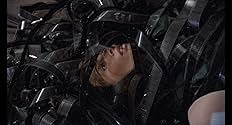A young musician (Andrea Occhipinti) moves in to a house for the summer, and soon he is surrounded by a series of murders. Evidence trickles in that the killer might be the previous tenant, but nobody knows for sure and some people refuse to talk. And what is in the locked room in the basement?
Lamberto Bava came out of his father's shadow to make "Macabre", one of the finest Italian horror films of its day. Often overlooked, it is slick and original, and well worth seeking out. He followed it up with "A Blade in the Dark", co-written by the legendary writer Dardano Sacchetti, which likely gave the film a boost. It, too, has superior picture and sound, far surpassing Fulci's films of the same era.
Bava protests that the film is "not really a horror film", and some have classified it as a mystery or thriller. This is warranted, but the intense blood, gore and chills make it firmly a horror story in my mind.
Luca Palmerini calls the film "morbid" and "misogynistic" with "claustrophobic overtones". I may agree on the last part, but the misogyny is a stretch. The women here do take a back seat (and the film does start out by calling Giovanni Frezza's character a "female" as an insult) but compared to horror as a whole I think it comes across as normal.
The English dubbing on the Anchor Bay DVD is a bit strange to me, mostly because the characters say "ciao" while otherwise speaking English. Maybe it is just me. But overall, I cannot complain -- a lot of terror comes from a very small blade, and this may be Michele Soavi's best work as an actor. Coupled with a haunting score, the film is gripping, though the music does tend to get a bit overplayed and old, especially after the first kill.
While the film is not as good as "Macabre", it deserves recognition. Bava threw it together rather quickly with a low budget and unknown actors, with minimal equipment (even the set was actually just the producer's house). Adapting it from a television script where the goal was to kill someone every thirty minutes, he did pretty well with it. Clearly, he was successful enough that he was able to keep directing and give us the now-classic "Demons".

















